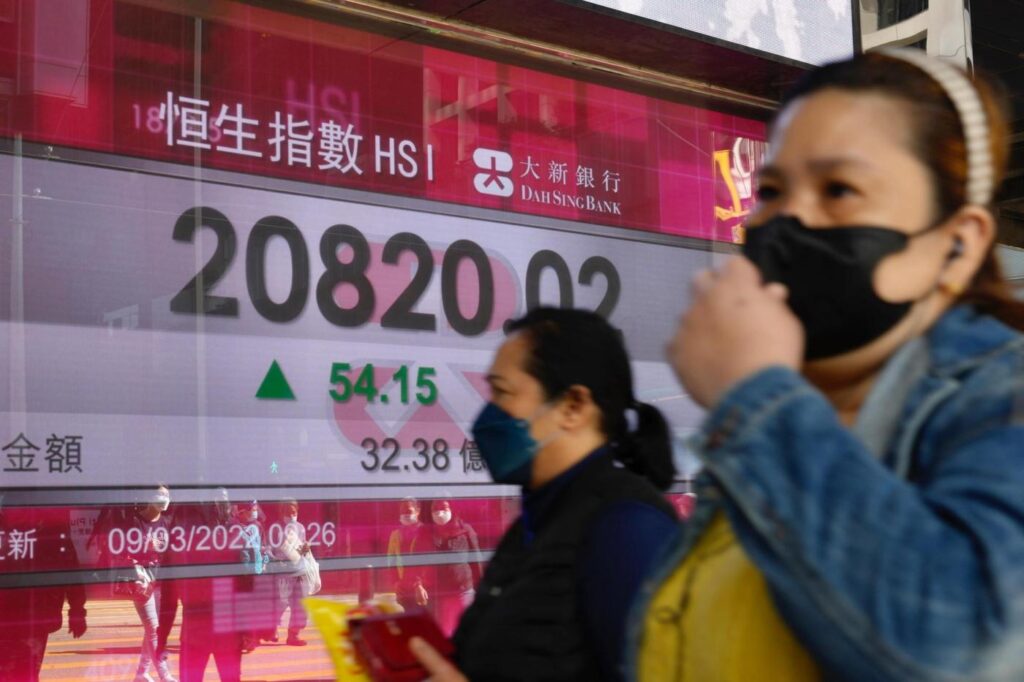
NEW YORK (AP) — Wall Street futures rebounded Wednesday and European shares rose sharply as investors eyed diplomatic efforts to end Russia’s attack on Ukraine, while Asian markets sank after Chinese inflation accelerated.
Futures for Wall Street’s S&P 500 index rose 1.8% and the same for the Dow Jones Industrial Average climbed 1.6% after the market slid Tuesday. Those declines carried over into Asia, where markets in Shanghai, Tokyo and Hong Kong slipped amid enduring unease about the war’s global impact, but investors seemed more optimistic by the time European markets opened.
“Financial markets seem calmer” as Ukrainian and Russian diplomats prepare to meet in Turkey, Chris Turner and Francesco Pesole of ING said in a report. “Yet energy prices look set to stay high as the West weans itself off Russian exports.”
Already high oil prices added more than $1 per barrel and then gave up those gains following President Joe Biden’s ban on imports of Russian crude.
The FTSE 100 in London jumped 1.7% while Frankfurt’s DAX surged 5% and the CAC 40 in Paris jumped 4.7%.
Analysts said investors appeared to be snagging bargains after recent losses.
In Asia, the Shanghai Composite Index tumbled 1.1% to 3,256.39 after China’s government reported consumer prices rose 0.6% in February over the previous month, picking up from January’s 0.4% gain.
The Nikkei 225 in Tokyo slid 0.3% to 24,717.53. The Hang Seng in Hong Kong lost 0.7% to 20,627.71 after being down 2.2% at one point.
Sydney’s S&P-ASX 200 climbed 1% to 7,053.00 and India’s Sensex advanced 2.3% to 54.684.42.
New Zealand and Southeast Asian markets rose. South Korean markets were closed for a presidential election.
Benchmark U.S. crude fell $3.73 to $119.97 per barrel in electronic trading on the New York Mercantile Exchange. The contract jumped $4.30 on Tuesday to $123.70.
Brent crude, the basis for international oil prices, gave up $3.25 to $124.73 per barrel in London. It advanced $4.77 the previous session to $127.98.
Commodities markets have been roiled because Russia is the No. 2 oil exporter and the No. 3 supplier of nickel, which is used in electric car batteries, stainless steel and other products. Russia and Ukraine also are among the biggest global sellers of wheat.
Nickel prices doubled Tuesday to more than $100,000 per metric ton, prompting the London Metal Exchange to suspend trading. The exchange said it did not expect to resume trading before Friday and was considering imposing limits on price fluctuations when it does.
A major Chinese producer of nickel and stainless steel, Tsingshan Group, faces potential losses of billions of dollars on futures contracts, The Asian Wall Street Journal and Bloomberg News reported. A woman who answered the phone at Tsingshan’s headquarters hung up when told a reporter was calling.
On Tuesday, Biden announced the United States would block imports of Russian crude to punish Putin for attacking Ukraine. Biden said he acted in consultation with European allies but acknowledged they are more dependent on Russian oil and gas and might not be able to make similar moves immediately.
Biden said he hopes to limit the pain for Americans but acknowledged the ban will push up gasoline prices.
Less than a week after removing from Russia its list of nations deemed a safe place to invest, Fitch cut its credit rating on the nation further into junk status and warned of an imminent default on sovereign debt.
The ruble, which has tumbled precipitously and is now worth less than a penny, slid another 4% Wednesday.
Fitch Ratings said that since lowering its credit rating last week, developments have “further undermined Russia’s willingness to service government debt.”
The ratings agency cited a wave of new sanctions as it dropped Russia’s credit rating another six notches late Tuesday, close to bottoming out.
Before the invasion of Ukraine, financial markets already were uneasy about the global outlook as the Federal Reserve and other central banks prepare to try to cool inflation by withdrawing ultra-low interest rates and other stimulus.
In currency markets, the dollar advanced to 115.88 yen from Tuesday’s 115.74 yen. The euro gained to $1.0977 from $1.0908.
Cryptocurrency prices got a boost on reports that Biden would sign an executive order on government oversight of cryptocurrency to study the risks and benefits of digital assets, according to one senior administration official. Bitcoin jumped more than 8% Wednesday morning to around $42,000, from just less than $39,000 the previous day.
